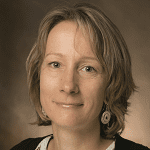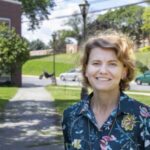The AABS 2022 Conference will look toward the future to explore how the Baltic States will move forward into the next century, as a crossroads between Europe and Asia, Nordic and Eastern Europe. Similarly, the field of Baltic Studies is at a crossroads between new and old diaspora communities negotiating the implications of what it means to advance the study and research of the Baltic States into the next century. The conference will promote intersections of academic disciplines, scholarship, and community by focusing on the implications for the Baltic States in the future at the crossroads of different regions, cultures, religions, and historical perspectives. Please find more information here, and registration here.
Ieva Zaķe (PhD, University of Massachusetts, Amherst) is Dean of the College of Arts, Humanities and Social Sciences at Millersville University.


Neringa Klumbytė (PhD, University of Pittsburgh) is Associate Professor, Department of Anthropology, and Director of the Lithuania Program at the Havighurst Center for Russian and Post-Soviet Studies, Miami University.
Professors Zaķe and Klumbytė are co-chairs of the Sociology, Anthropology, and Gender Studies division at AABS 2022. AABS met with them to discuss the division and what they are looking forward to at the conference. The transcript of our conversation has been lightly edited for clarity and length.
Our conversation took place on April 11, 2022.
AABS: To start, could each of you highlight something in the division that you think will be interesting for attendees?
IZ: One thing I found interesting was that we have papers that look at methods of research.
NK: We will have one section on research and methods which is focused primarily on migration. In the last decade, migration has been one of the major topics in Baltic Studies. Differently from other years, now we have a panel on migration but also on how to research it. There is a panel on democratization and civic participation: speakers will introduce new approaches to some of the old topics that have been explored since the collapse of the Soviet Union. A new topic in the anthropology and sociology section is environment. This is an increasing area of attention among social scientists in various disciplines, and it is exciting to see it in the anthropology/sociology section as well. We have a panel, “Landscapes of Imagination, Place, and Environment.” Another panel is focused on identity subcultures and artifacts. It combines anthropological, sociological, and historical research, which introduces methodologically novel approaches in our section.
AABS: Because there are similar conversations occurring across disciplines, what do you think attendees who are not in your field will gain from panels in your division, and help advance interdisciplinary thinking?
NK: I could say a few words about sociocultural anthropology. Anthropology widely uses ethnographic research and participant observation. It incorporates knowledge from local peoples’ perspectives and analyzes data in global and comparative contexts. Anthropology is often introduced to newcomers as the discipline that is the most scientific of humanities and the most humanistic of social sciences. It is interdisciplinary discipline historically. It is also generally highly theoretical. Although anthropologists borrow analytics and categories from literary scholars and from other disciplines, they give back various new theoretical and methodological approaches. They introduce new ways of thinking what it means to be human in diverse societies and contexts.
IZ: To add to that, that has always been the beauty of the Association and its conference: it’s interdisciplinary by definition. The interdisciplinarity happens so naturally, and in such productive and amazing ways between the Association and the people it brings together. Because we have our theme that connects all of us, this regional focus, it is so ripe for interdisciplinary work. Even though in our division, technically, people have to identify where they fall when they’re submitting proposals, I have to imagine a lot of them were thinking, “Well, I could be in this, or that, or somewhere else,” and so we just make these decisions, but all of us are participating in these exchanges at the conference. We’re crossing those borders all the time. The beauty of that is that it’s always comparative. It’s the natural historical, sociological, literary comparative work that runs through every conversation. I’ve always thought that the experience of the conference from that perspective is so special.
AABS: What are you most excited for at the conference, for yourselves? What are you looking forward to?
NK: What I feel as a scholar is that the war in Ukraine has very much challenged our analytics and the ways we see the world. I’m really looking forward to conversations about a variety of topics, interdisciplinary and comparative approaches, in the context of geopolitical changes. This, I imagine, is going to be part of our conversations. Although the panels were submitted before the war, I think this will come up one way or another, and I’m looking forward to seeing how our thinking, our theories and analytics have changed in this new uncertain and redefined by war global context.
IZ: I think that’s a really good point. The war will overshadow everything.
NK: One final thought: scholarly communities are now looking more and more at what Lithuanians, Latvians, Estonians, and, of course, Ukrainians are going to say. Unlike ten years ago, we’re now at the center of attention. In that sense, it’s our academic community’s responsibility to think about what we have to say, what we want to say, and what’s really important. I think that’s a good opportunity, historically, to give visibility to our countries as well as to our academic pursuits.
